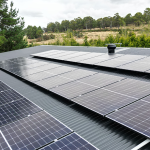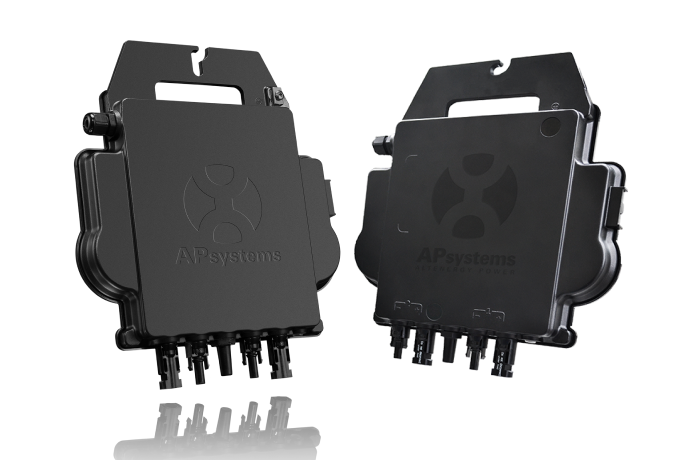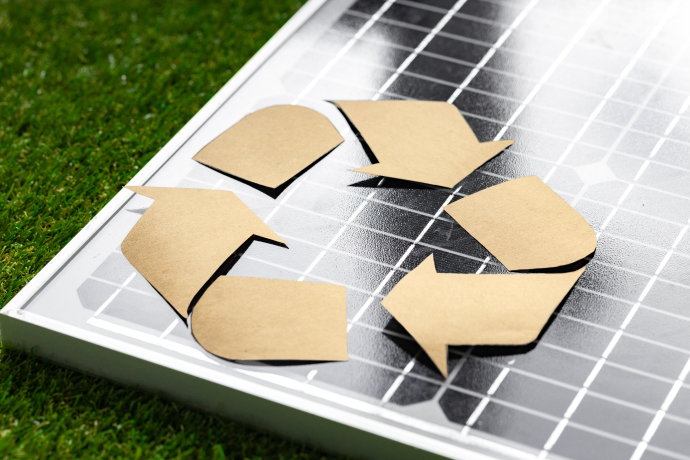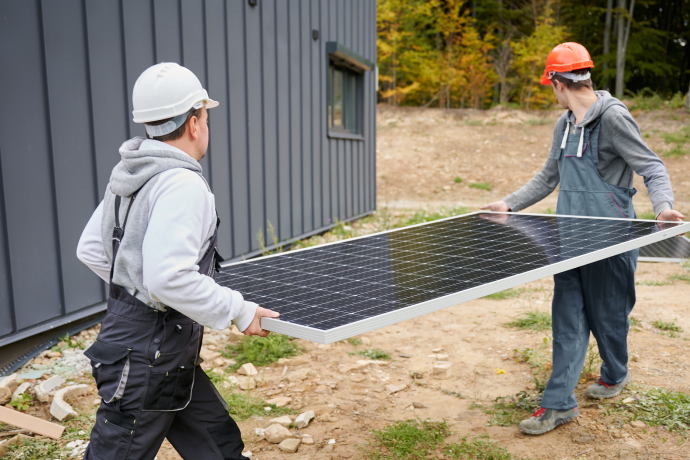Solar batteries store surplus power created by solar panels to be used at a later date. With a solar battery, homeowners can utilise all of the energy their solar panels create and reduce their reliance on the grid. While solar batteries have a myriad of benefits, the initial upfront cost can be a concern for some. We explain everything you need to know about the pros and cons of solar batteries, and how to work out the right solar battery for your needs.
What Is A Solar Battery?
A solar battery, also known as a home battery or energy storage system, is a unit that stores energy created by solar panels. Solar batteries interface with the solar system to hold any leftover electricity generated by the panels. This electricity can then be used when the sun is no longer out. A solar battery is a separate unit that is attached to the solar system via a charge controller and inverter. Once the solar panels have generated the electricity, it is sent to the charge controller which regulates the voltage going to the battery to make sure it doesn’t overcharge. The battery stores the electricity as DC electricity and then the inverter converts the DC to AC electricity to be used in the home.
While these are the most common solar batteries, there are also all-in-one units that typically include inverters and batteries and, in some instances, EV chargers.
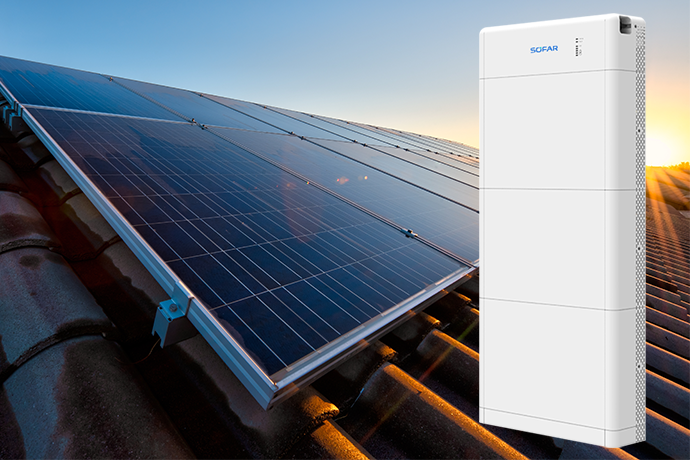
Solar Battery Benefits
As solar batteries store excess energy to be used at a later date, they have a plethora of benefits. The provision of a storage facility to keep surplus electricity means less reliance on the grid and reduced energy bills. We examine the benefits of solar batteries in more detail here:
- Reduced Energy Bills: Solar batteries can drastically reduce your energy costs through the storage of excess energy for use later. A battery allows you to use the stored energy during the evening or when the sun is not out rather than having to buy it from an electricity provider. This means less reliance on the grid and reduced energy bills. An average sized home with solar panels and a 10 kW battery can expect to save about $1,400 more per year on electricity because homes with solar batteries tend to use around 50 to 60%. of the energy they generate compared to the 25% energy usage of solar panels alone.
- Increased Energy Independence: Electricity storage in a solar battery leads to increased energy independence. A solar battery allows you to generate and use your own electricity generated by the solar panels which reduces or eliminates any reliance on traditional power companies. You can sell back to the grid at a low price of about 8-10c/kWh and buy back later at a premium.
- Environmental Benefits: There are many environmental benefits when choosing to install a solar battery. Because solar energy is a renewable energy source, there is minimal reliance on fossil fuels like coal or gas that are made in power plants which reduces the amount of carbon emissions from the plants. Solar energy is clean and renewable and emits little to no greenhouse gases so is much better for the environment.
- Backup Power: Solar batteries are the optimal backup power system when solar panels do not produce enough energy provided the battery is configured with this function. The stored energy in a solar battery with backup power functionality can be used to power the lights and appliances in the event the main power is down. Some solar batteries do not have backup power capabilities and will likely shut down during a power outage. However, it is possible to add backup power capabilities by adding a special inverter and charge controller.
- Increased Property Value: Solar panels and solar batteries are considered an added bonus when selling a home and increase property value. Studies suggest that 57% of homeowners would pay up to $10,000 more for a home with solar, and 60% would pay even more for a home with solar and a solar battery.
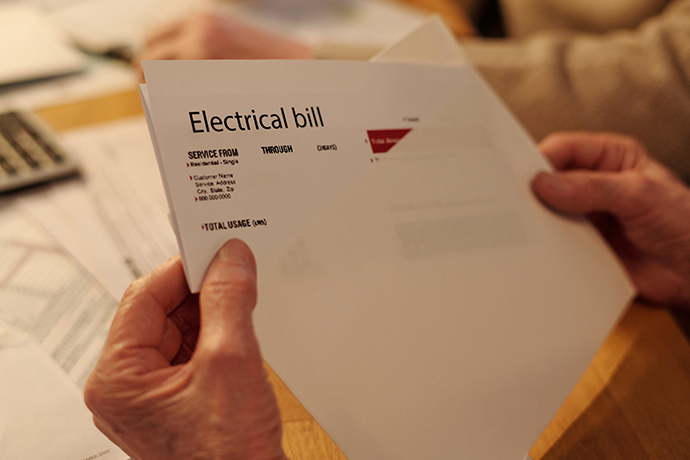
Solar Battery Disadvantages
While solar batteries offer a number of benefits, there are some downsides. The main issues with solar batteries include:
- Upfront Cost: The upfront cost of a solar battery is usually between $8,000 and $13,000 which can be intimidating. However, there are Government incentives to help keep costs down. The Cheaper Home Batteries Program provides a 30% discount on the upfront cost of installing eligible small-scale batteries as part of the expansion of the Small Scale Renewable Energy Scheme, which will reduce the upfront cost significantly. The Tasmania Energy Saver Loan Scheme* also provides interest free loans for the installation of energy efficient products and upgrades.
- Limited Capacity: Solar batteries do have limited capacity which means they can only store a certain amount of electricity. When the solar battery is full, any surplus electricity will be sent back to the grid. The largest size solar batteries sold are 10kWh to 20kWh for residential and commercial use respectively. The typical size and most commonly installed solar battery for residential use is a 10kWh battery that can hold 10 kilowatt hours of electricity. If there is a power outage, this limited capacity may not be enough for a homeowner’s needs. The warranty life and degradation in efficiency and usable capacity is a disadvantage. Typically 10-year warranty operates at about 60% efficiency.
- Safety Concerns: If not properly installed, some solar batteries can overheat and catch fire.
Are Solar Batteries Right For You?
Solar batteries can be a worthwhile choice for households with solar panels allowing the excess energy to be stored for later use. They help lower electricity bills, help the environment and reduce reliance on the grid. However, the upfront financial investment can be a catalyst for questioning if solar batteries are right for you. We look at the reasons solar batteries may or may not be right for you here.
- If you already have solar panels, a solar battery could be ideal for you. The investment of the solar panels has already been made and now you simply need to add a solar battery to maximise your independent energy usage.
- If you haven’t got solar on your roof and are paying $200 a quarter on power then solar and a battery is a great idea. You would maximise the available government rebates and slash your electricity bills.
- If you are producing more energy than you can use, a solar battery is a great idea. The extra energy generated by your solar panels would be better used in your home than being sent back to the grid.
- If your area is prone to power outages, a solar battery is a good choice. Solar batteries are an excellent source of backup power, ensuring lights and appliances can still work during times when there is no electrical connection available. Solar battery systems can be configured as a backup source of power in the event of a blackout.
- If you are on a time of use (TOU) tariff, and the cost of electricity is more in the evening, a solar battery is a worthwhile investment. You will not be paying more for electricity in the evening as you will be using the surplus energy leftover in the solar battery.
- If being environmentally friendly is important, a solar battery is a must. Solar batteries ensure less reliance on fossil fuels and on the grid and more energy independence.
- If you are eligible for Government subsidies or incentives, a solar battery will be much less expensive to install.
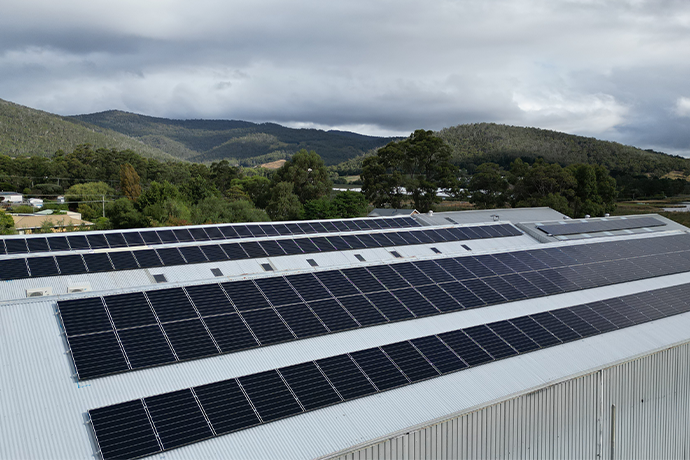
How To Pick the Best Solar Battery for You?
For the majority of homeowners, the best type of solar battery is typically lithium-ion, as they have a long lifespan and high density. However, there are other solar batteries that may be more suitable for you and your needs.
- Lithium-Ion Batteries: The most popular choice for homeowners, lithium-ion batteries are ideal for people with limited space as they are small compared to other solar batteries. They are more expensive, however, so if budget is an issue, another option might be preferable.
- Lead-Acid Batteries: If space is not an issue, lead-acid batteries are a great option and they cost less than other solar batteries too. The only problem is they can take a long time to recharge so consider if fast recharging time is a priority when choosing.
- Nickel-Cadmium Batteries: If your home or business is in a remote location, nickel-cadmium batteries will be the best choice of solar battery. These types of batteries are ideal for coping with extreme temperatures and situations that demand constant and uninterrupted power.
- Flow Batteries: For large scale commercial applications, flow batteries will be the best choice for solar battery backup. A reasonably new technology, flow batteries are useful for integrating renewable energy resources like wind and solar and excellent backup power source for remote areas.
Solar batteries are becoming increasingly popular as home and business owners are leaning more towards renewable energy and making the most of solar panels. To understand whether a solar battery is right for you and which type to choose, our article explains the pros and cons of solar batteries. For further information, contact the experts in all things solar at Tasmanian Safer Solar.
*This article refers to the Energy Saver Loan Scheme, which closed to new applications in September 2025


